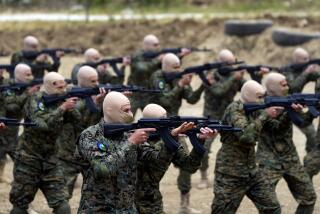Leave Iraq for Later
- Share via
The success so far of the war in Afghanistan raises the question of the next target of the U.S. campaign against terrorism. The clamor in some Washington quarters to put a bull’s-eye on Iraq fortunately seems to be subsiding. That is realistic acknowledgment that Baghdad, although a major regional threat, has not demonstrated global reach.
Countries such as Sudan, Somalia, Yemen and Indonesia are thought to be home to cells of terrorists from Al Qaeda or related groups, which should make them top areas of interest to Washington. In addition, Sudan and Yemen have cooperated with the U.S. campaign, either by sharing information or accepting U.S. intelligence help and raiding suspected militants’ camps. This would probably ease the way for at least limited operations inside either country.
As for Iraq, despite reports of contacts between members of Al Qaeda and Iraqi agents before Sept. 11, no one has yet produced credible evidence of Baghdad’s involvement in the New York and Washington attacks. Many members of the coalition that Washington successfully assembled for the fight against Afghanistan have warned they will not sign on for an attack on Iraq. That does not necessarily rule out unilateral action, but it would greatly raise the stakes. Another problem is the lack of an internal opposition force comparable to the Northern Alliance of Afghanistan, which battled the fanatical Taliban regime for years.
Last week U.S. officials suspended funding to the leading Iraqi group opposing President Saddam Hussein because it failed to account for tens of millions of dollars in U.S. aid. Bush administration officials also told Times correspondent Robin Wright that the opposition Iraqi National Congress wants Washington to pay for largely covert operations in Iraq. Since the group has no viable military operation inside Iraq and questionable support inside and outside the country, the United States is right to decline until conditions change.
Congress allocated $97 million to the Iraqi National Congress under the 1998 Iraqi Liberation Act, but the group has failed to use most of the money because of management problems; it has failed to send trainees to the Pentagon for months.
Iraq has refused to let U.N. weapons inspectors enter the country for more than three years, raising reasonable suspicions that it continues to work on prohibited chemical and biological weapons. Last July the United States and Britain tried to revise U.N. sanctions to ease the suffering of ordinary Iraqis. The sanctions date to the 1990 Iraqi invasion of Kuwait that launched the Persian Gulf War. But Russia’s veto threat blocked the revision. It’s worth asking Russia now whether it feels differently and is willing to help Washington revise sanctions, given Moscow’s desire for closer relations with Washington.
Iraq is a threat that must be contained. But for now this battle is better suited to the United Nations, especially in the absence of credible opposition fighters inside the country.
More to Read
Sign up for Essential California
The most important California stories and recommendations in your inbox every morning.
You may occasionally receive promotional content from the Los Angeles Times.










